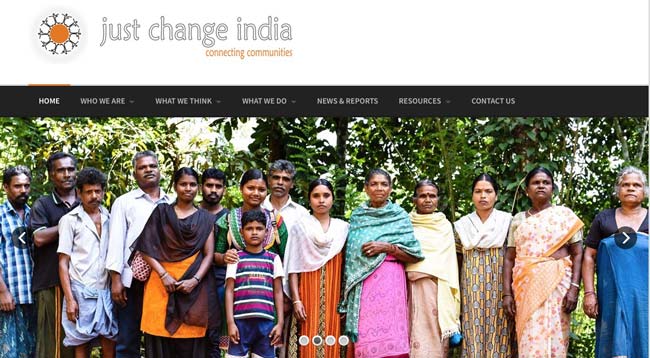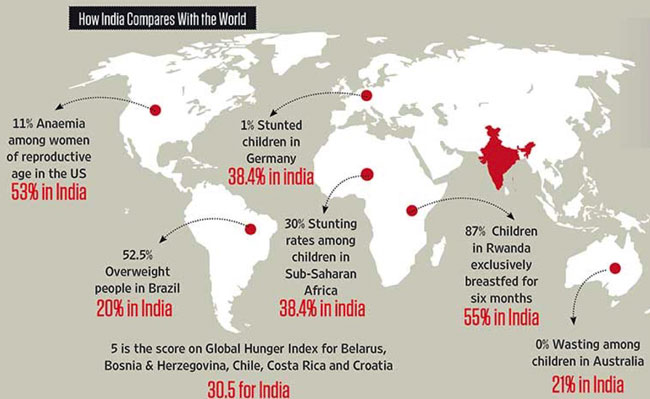
The concept of a mixed economy as envisaged in the Indian constitution gave way to a modern free market economy. As a result, the ground gained over the previous two decades in the fight against poverty began to slide out from under them. Accordingly, they are not taken in when they are told again and again that globalisation is good for all of us but that we must go through the belt-tightening phase even if eating less means malnutrition or death for the poorest women and children. At the same time, there are bigger houses, faster cars, and more partying opportunities for the rich who can afford them.
Source: “Humanising globalisation” by Stan Thekaekara (Co-founder, Just Change India), FEASTA REVIEW Number 2
URL: http://justchangeindia.com/wp-content/uploads/2018/04/Humanising-Globalisation.pdf
Date visited: 9 December 2019

Graphic © Outlook India 26 August 2019 | Enlarge >>
“The tribal food basket has always been diverse and nutritious” >>
Women’s rights are human rights. But in these troubled times, as our world becomes more unpredictable and chaotic, the rights of women and girls are being reduced, restricted and reversed. Empowering women and girls is the only way to protect their rights and make sure they can realize their full potential. – UN Secretary-General’s Message for International Women’s Day 2017 | Read more >>
India has ratified two significant global agreements to fight child slavery, and thus committed the country to better international labor standards regarding employment of children. These laws will also subject the country to more scrutiny by other nations.
India’s census found there were more than four million laborers aged between five and 14 in 2011 out of 168 million globally, but activists say millions more are at risk due to poverty. Indian Minister of Labor Bandaru Dattatreya said in statement the ratification reaffirmed the country’s “commitment to a child labor free society.” […]
The new agreements, which specify a minimum age of work and prohibit using minors in areas like armed conflict, prostitution, or drug trafficking, will lead nations to adopt the standards and to be reviewed every four years. […]
Nobel Laureate and activist Kailash Satyarthi [Founder, Bachpan Bachao Andolan] refers to the ratifications as a paradigm shift. “For years, India was saying we don’t have child slavery and was hesitant to admit the worst forms of child labor exist here, but now this government has agreed that this is a problem and that is why we are ratifying the conventions.” […]
India has one of largest populations of children in the world, with more than 40 percent of its 1.2 billion people below the age of 18, according to its 2011 census. […]
Source: Freedom United
URL: https://www.freedomunited.org/news/india-agrees-global-pacts-end-child-slavery/
Accessed: 28 November 2017
Interview with “Kailash Satyarthi: The child rights champion” by Elizabeth Kuruvilla, livemint.com, 12 August 2016 | Read the full interview >>
[…] The Child Labour (Prohibition and Regulation) Amendment Act, 2016, has come after 30 long years, despite widespread awareness of gaps in the law.
It’s quite shocking, and sometimes disgusting, to see—we are all proud, I’m proud at least, of being an Indian, (belonging to) a land of great values. We have the legacy of Buddha and Gandhi, the legacy of compassion and love and justice; all these are taught to us right from our birth. But we still have the stigma of having the largest number of child labourers in the world. […]
Source: http://www.livemint.com/Leisure/ehtcRH1tQB1GsSDhha7nbJ/Kailash-Satyarthi-The-child-rights-champion.html
Accessed: 28 November 2017
[Bold typeface added above for emphasis]
“Restoring land and livelihoods, empowering women, providing basic civic amenities such as fuel, water and sanitation are preconditions to advancements of rights of tribal children. Unless the government undertakes urgent steps to address these issues, its proclamations on child rights would remain examples of empty rhetoric and its actions would effectively continue to exclude those already sidelined.” – Archana Mehendale in “Isolated Communities and Ignored Claims: Tribal Children’s Right to Education in India” >>
“If women are empowered, there is more development in society” – Droupadi Murmu | Find this and other speeches by the 15th President of India >>
UN Women: International Women’s Day (updates) >>
Reports in the Indian press | List of periodicals included in this search >>
Search tips
Combine the name of any particular state, language or region with that of any tribal (Adivasi) community.
Add keywords of special interest (music, poetry, dance just as health, sacred grove and biodiversity); learn about the rights of Scheduled Tribes such as the “Forest Rights Act” (FRA); and the United Nations “Declaration on the Rights of Indigenous Peoples”, “Universal Declaration of Human Rights”, “women’s rights”, or “children’s right to education”.
Specify any other issue or news item you want to learn more about (biodiversity, bonded labour and human trafficking, climate change, ecology, economic development, ethnobotany, ethnomedicine, global warming, hunter-gatherers in a particular region or state, prevention of rural poverty, water access).
For official figures include “scheduled tribe ST” along with a union state or region: e.g. “Chhattisgarh ST community”, “Himalayan tribe”, “Scheduled tribe Tamil Nadu census”, “ST Kerala census”, “Particularly Vulnerable Tribal Group Jharkhand”, “PVTG Rajasthan”, “Adivasi ST Kerala”, “Adibasi ST West Bengal” etc.
In case the Google Custom Search window is not displayed here try the following: (1) toggle between “Reader” and regular viewing; (2) in your browser’s Security settings select “Enable JavaScript” | More tips >>
Note: hyperlinks and quotes are meant for fact-checking and information purposes only | Disclaimer >>
Find publications by reputed authors (add “open access” for freely downloadable content)
Related posts
“In fact, we still do not know to what extent global supply chains are maintained by slavery and child labor. Because of these and other factors, slavery today is more profitable than ever before, and also more woven into the global economy than ever before.” – Siddharth Kara on the persistence of modern slavery| Learn more >>
Human trafficking is a crime. To report in India, call
– Shakti Vahini +91-11-42244224, +91-9582909025 or
– Childline 1098 (national helpline)
Human Rights Commission (posts) | www.nhrc.nic.in (Government of India) >>
Learn more
Adverse inclusion | “Casteism” and its effect on tribal communities
Biodiversity and development – Jharkhand
Bondage | Bonded labour | Human trafficking | Slavery | Zamindari
Chief Justice of India | Imprisonment & rehabilitation
Childhood | Childrens rights: UNICEF India | Safe search
Colonial policies | Freedom Struggle | Independence
Community facilities | NGO | Organizations
Health and nutrition | Recommendations by the Expert Committee
Hul (Santal rebellion 1855-1856) | Tribal freedom fighters
Human Rights Commission (posts) | www.nhrc.nic.in (Government of India)
Information provided by Indian government agencies and other organizations (FAQ)
Nomadic and Semi-Nomadic Tribes | SEED – Government scheme
Shakti Vahini: Striving for Just, Free and Equitable society
Scheduled Tribe (ST) | Denotified Tribe vs. “criminal tribe“
State wise ST list (Scheduled Tribes)
Video | Hul Sengel: The Spirit of the Santal Revolution (1855) – Jharkhand
Video | Lessons on Human Trafficking – Freedom United
Women | Safe search | President Droupadi Murmu on women’s empowerment